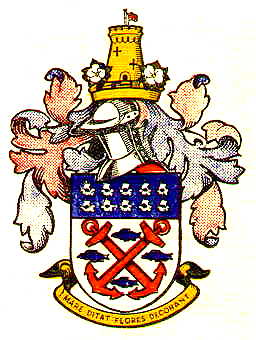Exmouth: Difference between revisions
Knorrepoes (talk | contribs) m (Text replace - "|}<seo title="Crest, Arms, Coat of Arms, Heraldry />" to "|}<seo title="Crest, Arms, Coat of Arms, Heraldry" />") |
Knorrepoes (talk | contribs) m (Text replace - "[[Literature" to "{{media}} [[Literature") |
||
| Line 25: | Line 25: | ||
The arms are continued by the town council | The arms are continued by the town council | ||
{{media}} | |||
[[Literature]] : Image and information from [http://www.civicheraldry.co.uk here] | [[Literature]] : Image and information from [http://www.civicheraldry.co.uk here] | ||
Revision as of 21:25, 8 July 2014
| Heraldry of the World Civic heraldry of the United Kingdom |
EXMOUTH
Incorporated into : 1974 East Devon
Official blazon
Arms : Argent two Anchors in saltire Gules between four Fish naiant Azure on a Chief of the last ten Ancient Ships in full sail five and five of the field.
Crest : Issuant from a Mural Crown Argent and between two Magnoliae grandiflorae Exmouthiensis proper a Tower Or thereon a Flagstaff proper flying therefrom to the sinister a Flag also Argent charged with a Cross Gules; Mantled Azure doubled Argent.
Motto : 'MARE DITAT FLORES DECORANT' - The sea enriches and the flowers adorn
Origin/meaning
The arms were officially granted on February 12, 1947.
The anchors, being naval emblems, indicate the town's association with the Royal Navy and the fish denote the town's connection with the fishing industry. The ten ancient ships in full sail commemorate the fact that in 1346 ten ships and 193 seamen were contributed from Exmouth to the fleet which, under Edward III, set out for the siege of Calais.
The mural crown is a common civic emblem and the tower or fort commemorates the fact that in 1646 a fort at the mouth of the Exe was defended from 7th February to 15th March, when on account of naval pressure the defenders had to surrender to Colonel Shapcote with 13 pieces of iron ordnance, 72 muskets, and 12 barrels of powder. The fort flies the banner of St George and on each side is depicted the flower and leaves of the magnolia; this commemorates the fact that Sir John Colleton, Bart (who died in 1754, is buried at Withycombe Raleigh School Burial Ground, and was the owner of Rill Manor), grew this beautiful flower at Exmouth for the first time in England, and called it Magnolia grandiflora Exmouthiensis.
The arms are continued by the town council
Contact and Support
Partners:
Your logo here ?
Contact us
© since 1995, Heraldry of the World, Ralf Hartemink 
Index of the site
Literature : Image and information from here










